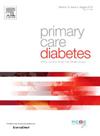勃起功能障碍是无症状糖尿病和糖尿病前期的预测指标。
IF 2.3
4区 医学
Q3 ENDOCRINOLOGY & METABOLISM
引用次数: 0
摘要
目的:勃起功能障碍(ED)和糖尿病(DM)都是常见的健康问题,两者有共同的风险因素。本研究旨在探讨在初级保健层面,勃起功能障碍能否预测男性的糖代谢功能障碍:方法:对 1933 年至 1956 年间出生的男性进行了一项为期 11 年的人群队列研究。基线调查于 2007-2008 年进行,11 年后进行随访检查。采用国际勃起功能指数(IIEF-5)问卷评估勃起功能。结合健康登记数据,使用2小时口服葡萄糖耐量试验(2hOGTT)对血糖异常进行评估:结果:与无勃起功能障碍的男性相比,有勃起功能障碍但无已知糖尿病史的男性在基线时未检测到糖尿病的发病率明显更高,比值比 (OR) 为 4.7 (95 % CI 1.6, 14.4),糖尿病前期的比值比 (OR) 为 1.9 (1.1, 3.2)。在长达11年的随访期间,观察到在研究开始时报告有ED症状的男性的DM累积发病率明显增加:结论:ED症状似乎是现有糖尿病和糖尿病前期的早期预警信号,可预测未来发生糖代谢异常的风险增加。本文章由计算机程序翻译,如有差异,请以英文原文为准。
Erectile dysfunction as a predictive indicator of asymptomatic diabetes and prediabetes
Aims
Both erectile dysfunction (ED) and diabetes (DM) are common health problems that share risk factors. The aim of this study was to investigate whether ED can predict glucose metabolism dysfunctions in men at the primary care level.
Methods
An 11-year population-based cohort study was conducted in men born between 1933 and 1956. The baseline survey was conducted in 2007–2008, with a follow-up examination 11 years later. The International Index of Erectile Function (IIEF-5) questionnaire was used to assess erectile function. Dysglycemia was evaluated using and a 2-hour oral glucose tolerance test (2hOGTT), in combination with health registry data.
Results
At baseline, men with ED but without a history of known DM exhibited a significantly higher prevalence of undetected DM, odds ratio (OR) 4.7 (95 % CI 1.6, 14.4), and preDM, OR 1.9 (1.1, 3.2), compared with men without ED. Over an 11-year follow-up period, a significantly increased cumulative incidence of DM was observed in men who reported symptoms of ED at the start of the study.
Conclusions
The symptoms of ED appear to be an early warning sign of existing DM and preDM and predict an increased risk of developing abnormal glucose metabolism in the future.
求助全文
通过发布文献求助,成功后即可免费获取论文全文。
去求助
来源期刊

Primary Care Diabetes
ENDOCRINOLOGY & METABOLISM-PRIMARY HEALTH CARE
CiteScore
5.00
自引率
3.40%
发文量
134
审稿时长
47 days
期刊介绍:
The journal publishes original research articles and high quality reviews in the fields of clinical care, diabetes education, nutrition, health services, psychosocial research and epidemiology and other areas as far as is relevant for diabetology in a primary-care setting. The purpose of the journal is to encourage interdisciplinary research and discussion between all those who are involved in primary diabetes care on an international level. The Journal also publishes news and articles concerning the policies and activities of Primary Care Diabetes Europe and reflects the society''s aim of improving the care for people with diabetes mellitus within the primary-care setting.
 求助内容:
求助内容: 应助结果提醒方式:
应助结果提醒方式:


